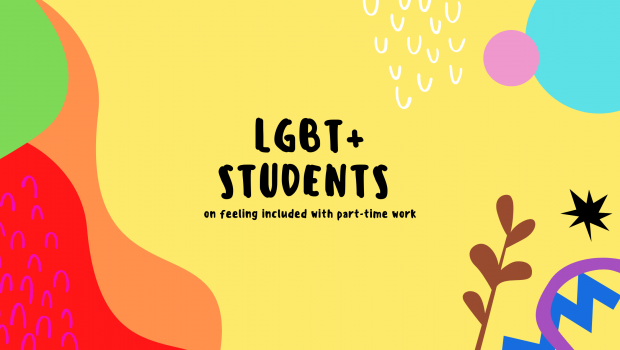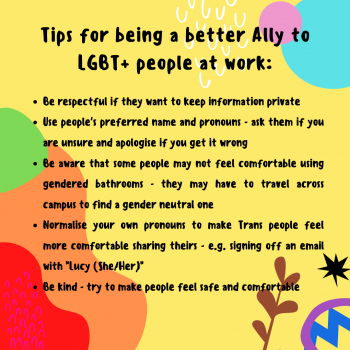
LGBT+ students – on feeling included with part-time work
Campus Jobs aims to make part-time work accessible to everyone, but there is always room for improvement. That’s why we have been speaking to Lauren and Lennox, whose various roles and experiences on and off campus have given them expertise in how we can better cater to the needs of LGBT+ students in their part-time work. They also give some useful advice for non-LGBT+ students and line managers to consider when they are working alongside their LGBT+ colleagues.
Interview with Lauren (she/her)
Lauren is a third year Art and Philosophy student, who is currently doing an internship through the Reading Internship Scheme with SupportU – a charity that provides specialist support and resources for LGBT+ people.
What have you learnt from your internship – especially about working with the LGBT+ community?
I have learned lots of practical skills such as handling social media platforms on behalf of an organisation, constructing surveys and creating informative campaigns and packages. In regards to insight into the community, I have been able to witness the diversity of the community and the types of support that really benefits people. I think it’s important to consider the variety of personal situations people are in. Different clients need different support. Through my internship I have had to consider how to reach different members of the community and how to correspond with different people.
What do you think the challenges are for the LGBT+ community when looking for work?
I think that there are lots of challenges due to subtle bias and lack of education around LGBT+ issues. Even if a business or organisation is LGBT+ friendly, there may still be a lack of understanding of some issues and how to address these issues. Just because a business is LGBT+ friendly you may still encounter many individuals who do not hold that view.
As well as this I really think that non gender conforming individuals are at a disadvantage, as people are sometimes unable to understand gender as a fluid concept, meaning that they can sometimes be disrespectful unintentionally. Also, I think that people who present themselves in a contrasting way to typical gender expression, can be penalised and made to feel this is not suited to the working environment. Whereas this is not an issue of professionalism, but rather an issue with the traditional view of the gender binary. Additionally, many LGBT+ feel they need to separate their private lives and professional lives further than a non-LGBT+ person would, due to fear of judgment and being seen negatively. For example, more LGBT+ people would feel awkward about having pictures of their partners/family on their desk.

What do you think could be done to encourage more of the LGBT+ community into part time work?
I think reassurance is needed that they are protected and in a safe environment. I also think that it is important that personal information can remain private if they wish. Maybe more needs to be done to expose the LGBT+ community to professional work environments, so that they can become comfortable and reduce any anxieties that they may have. Perhaps career days for LGBT+ people, where LGBT+ safe marked organisations attend and explain the way in which they cater for LGBT+ people and their specific needs. Also talks from successful LGBT+ individuals would be really interesting and encouraging.
Interview with Lennox (they/them)
Lennox is a fourth year Art student. They are RUSU’s Trans officer and has previously been on the LGBT society committee. They have also worked part time through Campus Jobs in many roles, including as an Assistant in the Art Shop
What do you think the challenges are for the LGBT+ community (or more specifically the trans community) when looking for work?
Challenges to consider for LGBT+ people when looking for work might include:
- Being misgendered (having the wrong pronouns used);
- Having the wrong name be used (this is called ‘deadnaming’);
- Not having access to gender neutral restrooms;
- Trans men not having access to bins in men’s bathrooms for menstrual supplies;
- Managers not being informed on LGBT+ issues and potentially being unwilling to use the correct name and pronouns for transgender staff.

What do you think could be done to encourage more of the LGBT+ community (or more specifically the trans community) into part-time work?
- Reflection of preferred names on Campus Jobs website would help
- LGBT+ focused sensitivity training would be beneficial
- Normalisation of pronouns – for example, RUSU staff include their pronouns in their email signatures, which has made me feel safer working with them
Are there any things to take into consideration when working with LGBT+ people (or more specifically the trans community)?
- Take into consideration that many transgender people use different names to their legal name.
- Be aware of gender-neutral pronouns, such as they/them, zie/hir, xe/xem, etc. (see this helpful guide to gender-neutral pronouns).
- Normalising your own pronouns can allow a trans person to feel safer using their pronouns.
- Be aware that many transgender people do not feel comfortable using gendered restrooms – either because they don’t align with their gender identity, or they do not feel safe to use them. This means that, if a gender-neutral restroom is not available locally, they may need to travel across campus to use one.
- The emotional stress of being misgendered, deadnamed, or otherwise discriminated against will reduce a person’s ability to give their all at their job.

We would like to thank Lauren and Lennox for their valuable insights and feedback. Based on this feedback there are some changes (such as including the team’s preferred pro nouns in our email signatures) that we can immediately implement. Some of the suggestions, particularly in relation to our IT systems, will unfortunately take longer to implement as they will require input from our software providers and colleagues in IT. However, we are committed to getting these changes in place as quickly as possible.
Campus Jobs as a service is committed to fully supporting members of the LGBT+ community. However, there are occasions when we are required to do something in a particular way that is far from ideal (and we would rather not have to do). For example, our timesheets system asks for gender with the only available answers being ‘male’ or ‘female’. This is because HMRC only allow us to provide two possible answers as the state pension age is different between males and females. We are also required to include an individual’s legal name on our formal assignment offers, having said that there is definitely work we can do to also include preferred names and improve how this is presented overall.
We are determined to make all workers feel as comfortable as possible when working through Campus Jobs. We have invited Lauren, Lennox, the University’s Dean for Diversity, and representatives from RUSU to be involved with the planning and implementation of these changes to better reflect the needs of the LGBT+ community. We also plan to update you on our progress very soon!
Should you have any suggestions on how we can improve, concerns about anything you see written here, or anything you wish to raise about your part time work through Campus Jobs, please contact Jay Russell (Campus Jobs Manager) or Rachel Jeans (Campus Jobs Deputy Manager).
Some further resources:
For LGBT+ advice or support:
- https://lgbt.foundation/
- Join the Reading University LGBTQ+ student’s community Facebook group
- Contact your LGBT+ or Trans officer at RUSU https://www.rusu.co.uk/representation/student-reps/part-time-officers/
Thank you to Lucy Harwood (Campus Jobs Help Desk Team) for contacting Lauren and Lennox for their take on this topic.
